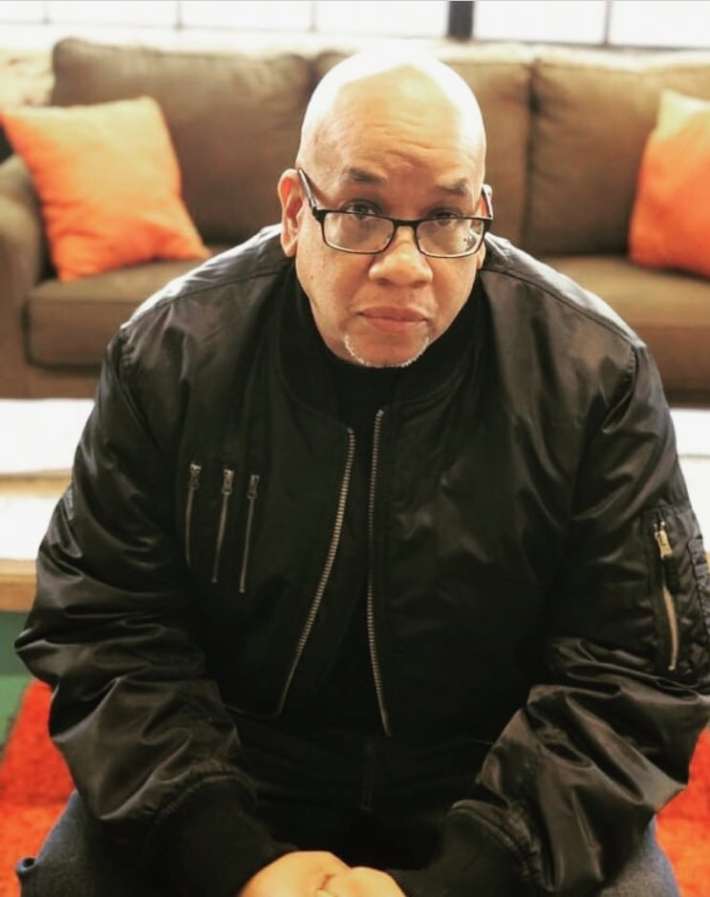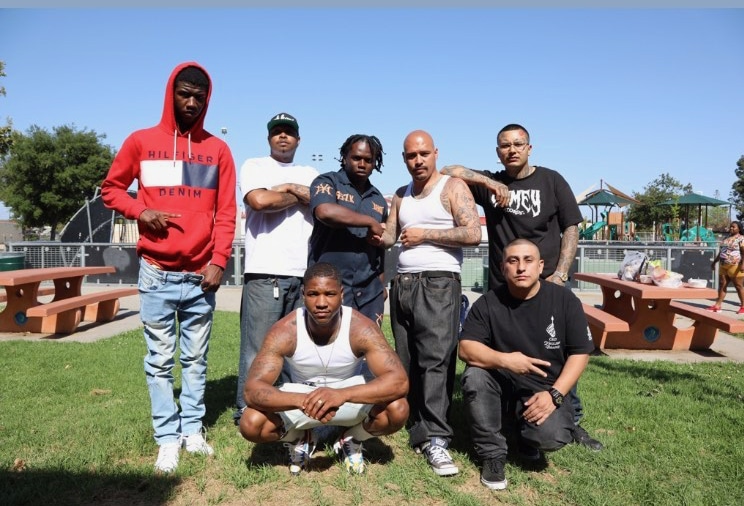[dropcap size=big]L[/dropcap]atino community members, including Paramount rapper Swifty Blue, have been sharing online fundraisers to support street vendors who have become targets of assault during recent weeks. The rapper has been seen as a Robin Hood-like hero character since more of these types of incidents have been reported since the start of L.A.'s shelter-at-home order, prompting many to tag him.
These efforts helped raise over $10,000 for an elote lady who was seen assaulted on video and $23,000 for the raspado man who was senselessly slapped on camera.
“They do not have anyone to protect them. They are vulnerable. They can talk, but they do not have the platforms to voice the message they are trying to get across. I took it upon myself to help them out,” Swifty Blue said last Sunday afternoon.
He was gathered at a park in South Central with Black and Latino gang members including BigDragga from Hoover, to try and stop any further retaliation from these incidents posted online. Not only did these gang members discuss the issues arising in their communities. They shared a meal and a few packs of beer.
Members from the African American community with platforms began to speak on the issue including DJ Hed from 92.3 The Real. After multiple videos surfaced last week showing Latino vendors being assaulted, Compton Rapper Bandana Rag posted a video that has now gone viral.
He made it explicitly clear that type of behavior is highly inappropriate and called for an end to these random acts of violence.
“I didn’t want innocent people to get hurt because I know how the streets work. I have lost family, I have lost friends. I’ve been affected in a serious manner,” said Bandana Rag.
It is easy to see these acts of violence as growing racial tensions in the Black and Brown communities of urban Los Angeles. However, a closer look reveals the reality of these actions as isolated events being done by misguided youth seeking views on Instagram.
“If you don’t have any substance and all you [hear] is kill, gang-gang, that’s what you gonna do. These kids come from broken homes, no fathers in these homes, they look to the streets as a father. What do you see on the streets? You see graffiti, you see shell casings, you see police,” Bandana Rag illustrated.
Rudy Espinoza and his organization Inclusive Action advocate for street vendors in low-income areas of Los Angeles. Inclusive Action was one of many organizations that worked to legalize street vending in L.A. They also have a microloan program to provide assistance to street vendors.
“Street vendors, whether Latino or Black, are really vulnerable in Los Angeles. We were successful in legalizing street vending but the city and the county have taken a really long time to develop their systems to help formalize these businesses,” Espinoza expressed. “Without that extra protection, many street vendors are still operating in the informal economy. When they see something happen in the neighborhood or something happen to them, they still have a lot of fear in reporting the incident.”
We often live in such close proximity that our brothers and sisters become friends, some lovers, and eventually family.
Espinoza said the COVID-19 crisis has created another layer of vulnerability for street vendors who cannot access government assistance and rely on street vending as their only source of income. He shared that in the past week, the Los Angeles Department of Public Health threatened that unlicensed vendors can face a $1,000 fine and a misdemeanor.
Due to executive orders signed by President Trump Espinoza says this puts undocumented street vendors on the path to deportation. This makes Espinoza worry about how many street vendors will financially survive the coronavirus pandemic.
“People can’t pay rent, they can’t put food on the table. We have paused our loan program and told people not to pay us money and they should keep it. People are really struggling. They are desperate to find resources. They are desperate to work which is why some street vendors are still vending.”
Many argue that racial animosities have persisted in the Black and Brown community for some time. Espinoza says he does not see that view from the community organizing work he does which is primarily Black and Brown.
Gang relations in Los Angeles have complicated race relations along with deeply rooted anti-Black attitudes. It is important to note that individual attitudes do not represent an entire ethnic group of people and we should check our own biases if we believe such.
“According to a UCLA study, Blacks and Mexicans in L.A. have one percent of the wealth that white people have. To me, we focus on the tension between our people but we are dealing with the same stuff. When I saw the videos I was angry like everybody, but at the same time, let’s protect each other. We are all being impacted in similar ways. We need to focus on the bigger picture which is they don’t want us to unite.”
Although street vendor assaults were posted by misguided gang members these actions had real-life implications in the streets that stretch far beyond Instagram. Thousands of Instagram comments showed many in the Latino community were infuriated at the assault on street vendors and called for the youngsters to be “dealt with.”
Multiple unconfirmed addresses of the alleged assailants were shared and posted within the comments. Many pointed to the overwhelming anti-Black comments as proof of Latino animosities before the assaults.

Skipp Townsend is the Executive Director of 2nd Call and his organization aids in the development of ex-offenders. He says most of the people online instigating racial tensions are just stirring the pot and are not privileged to the fact agreements and phone calls were made immediately.
“It’s not that no one cares—which is the part that frustrated me—people online saying no one in the Black community cared,” said Townsend. They are not a part of the process and they do not know what the process is. They don’t know the right people to call. The right people who can call peace, have already called peace.”
“I think it is more an individual thing than a gang thing...”
Gang relations in Los Angeles have complicated race relations along with deeply rooted anti-Black attitudes. It is important to note that individual attitudes do not represent an entire ethnic group of people and we should check our own biases if we believe such.
Sociologist, journalist, and gang-expert behind the site StreetGangs.com, Alex Alonso, says that despite certain politics and alignments in prison, the actual number of Black and Latino gangs that are at war currently in Los Angeles is low.
It is important to not get lost pointing fingers over which side of the Black and Brown community is more responsible for perpetuating violence because the deeper rooted issues in our communities will never be addressed. Powerful alliances between Black and Brown are important to fight the systemic oppression that has so many of us at a disadvantage.
“I think it is more an individual thing than a gang thing. I think there are a lot of Mexicans that don’t like Blacks that are from gangs. But within that same gang, there are a bunch of Mexicans that are like, I’m cool with them. I do not think there is a whole gang that says I do not like Blacks, it is more on a personal level. Just like with the Brothers.”
The Black and Brown communities in Los Angeles share common experiences of being labeled the “other” in a country built off the back of our people. We often live in such close proximity that our brothers and sisters become friends, some lovers, and eventually family.
It is important to not get lost pointing fingers over which side of the Black and Brown community is more responsible for perpetuating violence because the deeper rooted issues in our communities will never be addressed. Powerful alliances between Black and Brown are important to fight the systemic oppression that has so many of us at a disadvantage.
“I think the most important thing is that everyone can do their part not to instigate but to bring peace by simply talking to those who are in their homes. Talking to their children, grandchildren, and their own brothers and sisters. To let them know that whatever they do, can ruin the relationships for everyone in the community,” Townsend relayed.







